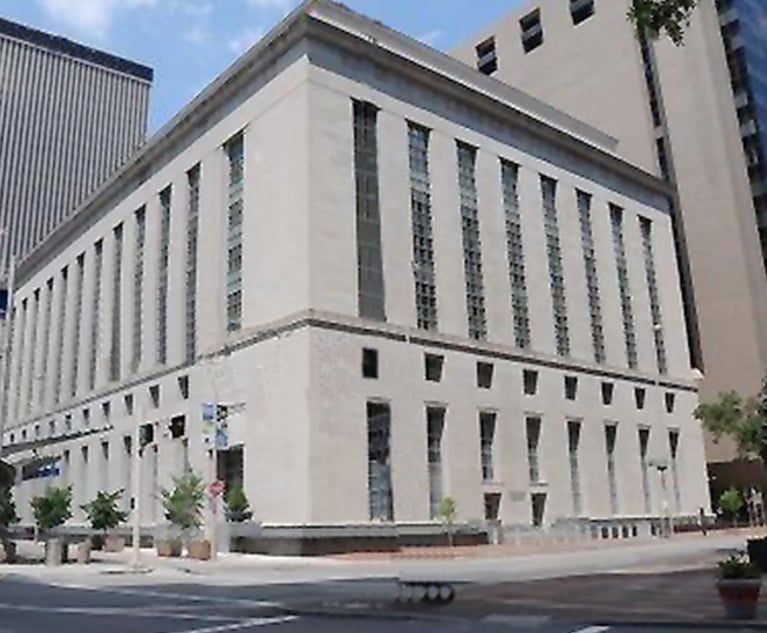Features

Relocating Easements By Servient Owner
Under what circumstances can a servient owner relocate an easement? New York's Second Department recently faced that question and reaffirmed the rule that a servient owner cannot unilaterally relocate an easement when the easement agreement depicts the precise location of the easement.
Features

Copyright-Termination Case Complexities and Sixth Circuit’s Decision In “Que Sera Sera” Litigation
The Nashville federal court where the lawsuit was filed summarized the litigation as “concern[ing] the rights to a prolific composer’s music, a dizzying estate plan, and two descendants at odds over how to manage the royalties those compositions earn.”
Features

Inconvenient Interlocutory Bankruptcy Appeals — A Reply
A bankruptcy judge, his law clerk and two law students challenged this author’s opinion piece entitled “Inconvenient Bankruptcy Appeals” from the December 2024 issue of The Bankruptcy Strategist that district courts and Bankruptcy Appellate Panels have been rigidly limiting appellate review of interlocutory bankruptcy court orders as a matter of convenience. The critics argue instead that these courts consistently apply appropriate statutory and decisional standards when they decline appellate review, striving to “get it right.” A quick reply follows.
Features

Opportunity Zone Program Gets Renewal — and An Upgrade — With One Big Beautiful Bill Act
For investors, real estate developers and communities, with new incentives now available and the permanent status of the QOZ program, substantial tax benefits and the opportunity to improve disadvantaged areas are welcome news for 2025 and beyond.
Features

Closing the Gaps In Legal Document Management: The Top 6 Things Law Firms Need to Know
Firms no longer have the luxury of making do: productivity is leaking, risk is compounding, and legacy systems — once seen as untouchable — are now being scrutinized through a different lens that prioritizes agility, security, and user experience. From dispelling misconceptions, to the risk of traditional print and how to focus on the basics, here are the top six things firms need to know about closing the gaps in legal document management.
Features

When Sanctions Fail: The Ovsiannikov Case and Why Enhanced Due Diligence Must Become a Compliance Standard
As geopolitical tensions escalate and global sanctions regimes become more aggressive, the Ovsiannikov case serves as a stark warning: checkbox compliance is no longer sufficient. EDD must become the operational standard — not just in banking, but across every sector involved in high-risk transactions.
Features

Navigating DOJ’s New White-Collar Playbook
Key Risks for Government Contractors, Tech Companies and Healthcare EntitiesThe DOJ recently unveiled a series of policy updates that shifted the white-collar enforcement landscape. These updates — an emphasis on the False Claims Act, a shift away from the Foreign Corrupt Practices Act, and increased incentives for self-disclosure and whistleblowers — are poised to reshape how companies approach compliance.
Features

Reducing Litigation Risks for Sports Organizations In PI Data Collection
What started off as a law directed at Blockbuster video rentals is now being deployed against the New England Patriots, part of a broader privacy trend that will increasingly impact a sports industry eager to embrace advanced technologies that exploit fan and athlete data. A class action filed against the NFL team alleged the storied franchise ran afoul of the Video Privacy Protection Act by sharing the personal information of fans who used the team’s app.
Features

Current Proposal Generation Is Failing Law Firms
Clients now demand faster, more tailored responses. And as expectations rise, so does the pressure on law firms to deliver with greater speed, accuracy, and professionalism. But new research suggests the profession isn’t keeping up.
Features

How to Protect Your Clients Against Predatory Merchant Cash Advances That Are Quietly Killing Small Businesses
Over the past several years, the merchant cash advance (MCA) industry has grown substantially, fueled by small and middle market businesses needing quick financing once COVID-relief programs ended, with creative and aggressive lenders waiting to meet those needs. Before considering legal options for businesses that have secured MCAs, it is important to understand what an MCA is and why it poses a risk.
Need Help?
- Prefer an IP authenticated environment? Request a transition or call 800-756-8993.
- Need other assistance? email Customer Service or call 1-877-256-2472.
MOST POPULAR STORIES
- Use of Deferred Prosecution Agreements In White Collar InvestigationsThis article discusses the practical and policy reasons for the use of DPAs and NPAs in white-collar criminal investigations, and considers the NDAA's new reporting provision and its relationship with other efforts to enhance transparency in DOJ decision-making.Read More ›
- The DOJ's Corporate Enforcement Policy: One Year LaterThe DOJ's Criminal Division issued three declinations since the issuance of the revised CEP a year ago. Review of these cases gives insight into DOJ's implementation of the new policy in practice.Read More ›
- A Lawyer's System for Active ReadingActive reading comprises many daily tasks lawyers engage in, including highlighting, annotating, note taking, comparing and searching texts. It demands more than flipping or turning pages.Read More ›
- Practice Tip: The Earning Capacity of Business OwnersThe owner of a business can claim as lost earning capacity in a personal-injury action only the working time lost due to injuries and harm to future earning capacity, not the business' alleged profits in perpetuity.Read More ›
- The DOJ's New Parameters for Evaluating Corporate Compliance ProgramsThe parameters set forth in the DOJ's memorandum have implications not only for the government's evaluation of compliance programs in the context of criminal charging decisions, but also for how defense counsel structure their conference-room advocacy seeking declinations or lesser sanctions in both criminal and civil investigations.Read More ›
